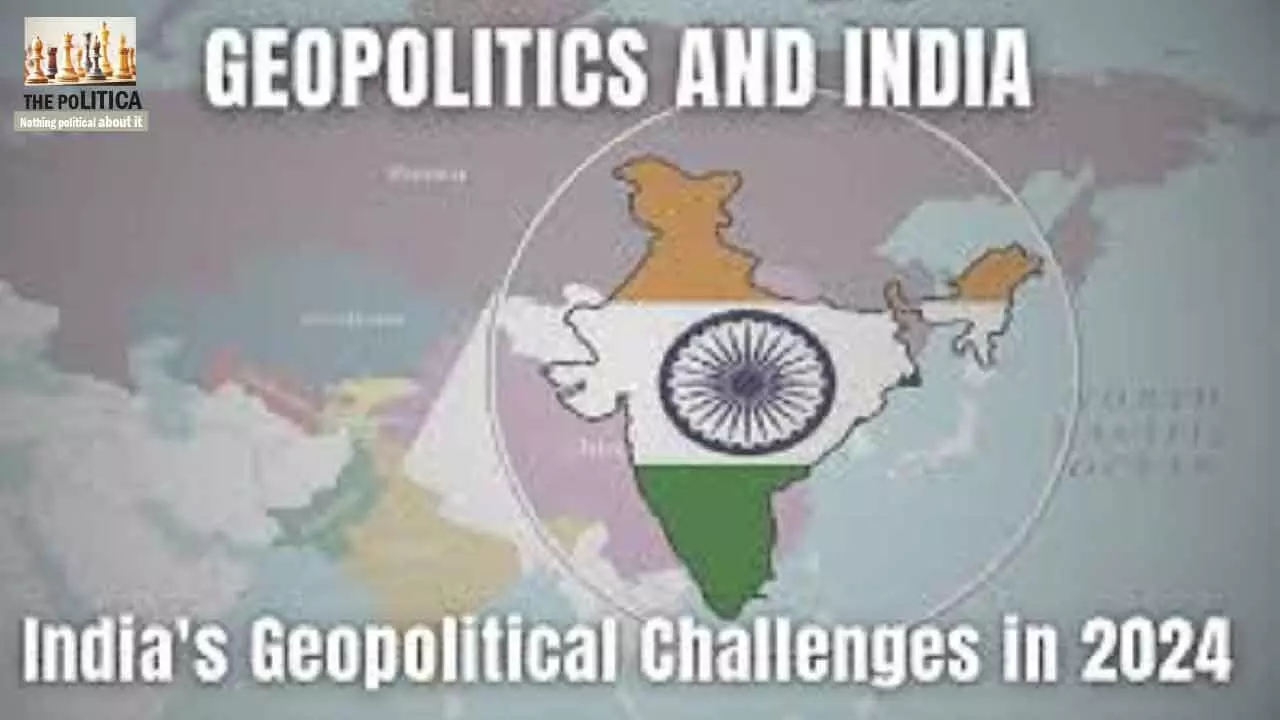Bharat’s Geopolitical Landscape In 2024: Navigating Turbulence, Challenges
The year 2024 posed significant challenges to India’s geopolitical and economic stability, marked by external pressures and regional volatility
Bharat’s Geopolitical Landscape In 2024: Navigating Turbulence, Challenges

In 2024, Bharat faced unprecedented geopolitical and economic challenges, from election interference and financial sabotage to regional unrest fueled by global powers. Despite these pressures, Bharat’s resilience and strategic autonomy underscored its readiness to navigate turbulence, safeguarding its interests in an increasingly volatile international landscape
With geopolitical and geoeconomic crises leading to the erosion of international norms and deepening great power rivalry, 2024 will be ranked among the worst years in recent decades for international relations.
Bharat, too, had to recalibrate its geostrategic moves in the subcontinent due to the collapse of Bangladesh, dividing its attention from Pakistan at such a critical juncture.
As global leaders, security experts, geopolitical commentators, analysts, and observers are nervously counting down to January 20, 2025, the day President-elect Donald Trump takes over as the 47th President of the United States of America, in the hope that he and his hand-picked team of Avengers, that includes business tycoons, techies and seasoned politicians, will neutralising the American deep state which is responsible for global chaos and anarchy.
Will the coming year be any different for the world, especially for Bharat?
The recent videos on social media of “American veteran” training and arming the Kuki tribal youths, left-leaning and opportunistic Indian politicians deliberately spreading misinformation to create unrest across the nation, deep state agencies orchestrating financial sabotage by targeting Indian business entities such as Adani by planting slanted narratives are all pointing towards a tough year for New Delhi as “Breaking India” forces are working in overdrive to push Bharat into a precarious geopolitical position.
According to leading Indian geopolitical analysts who regularly appear on The Jaipur Dialogues( TJD), a platform comprising of the sharpest minds in geopolitics, geoeconomics, and geostrategy, the turmoil in Manipur & Bangladesh has been propagated by the American deep state with tacit support from Five Eyes (FVEY) - an intelligence alliance comprising Australia, Canada, New Zealand, the United Kingdom, and the United States, to gain influence in the subcontinent and especially in the Indian Ocean Region.
The analysts further argue that the foreign powers intend to carve out a Christian state by annexing the territories of Northeast India, Bangladesh and Myanmar, which is friendly to its regional geostrategic designs. Such a possibility shall give the deep state a foothold in the region to check the growing power of India and China.
The analysts further claim that the geopolitical dichotomy is in the fact that Israel, an ally of India, is part of the grand plan. Such dual play in international relationships validates Bharat’s theory of maintaining geopolitical autonomy and New Delhi imposing its trust-bias slanted towards Moscow instead of the West.
The year 2024 posed significant challenges to India’s geopolitical and economic stability, marked by external pressures and regional volatility.
One of the most concerning developments in 2024, according to the TJD think-tank, was the attempts to manipulate India’s general elections. Foreign entities, in collaboration with certain Indian politicians and NGOs, sought to influence the democratic process through targeted disinformation campaigns.
On the economic front, the Adani Group suffered a monumental blow, losing $147.11 billion in market value following allegations presented in a “fabricated” report by Hindenburg Research, a US-based short-seller. The manufactured report on corporate misconduct was part of a broader effort to destabilise India’s stock market and economic momentum.
India’s foreign policy also faced considerable scrutiny from the Western media; on numerous occasions at international meets, External Affairs Minister S. Jaishankar was subjected to intense questioning for maintaining energy ties with Moscow amid the ongoing Russia-Ukraine conflict while the same reporters ignored EU oil purchase practises from Moscow.
In the Indian Ocean region, as part of the “India Out” campaign by the newly elected President of Maldives, New Delhi’s diplomatic acumen was tested. The campaign sought to weaken India’s influence in the region, further complicating Bharat’s neighbourhood diplomacy.
The year ended with a regime change in Bangladesh that saw brutality against Bangladeshi Hindus to generate a violent response against Indian Muslims and to create pressure on New Delhi to take military action there by sucking Bharat into a military confrontation.
Despite these challenges, India demonstrated resilience, leveraging its diplomatic and economic strengths to navigate a turbulent year.
The events of 2024 highlight the need for Bharat to adopt greater vigilance and proactive strategies to safeguard its national interests. From securing its democratic institutions to countering economic sabotage and reinforcing neighbourhood diplomacy, Bharat must continue to assert its role as a stabilising force in an increasingly turbulent world.
(The author is Founder of My Startup TV)

